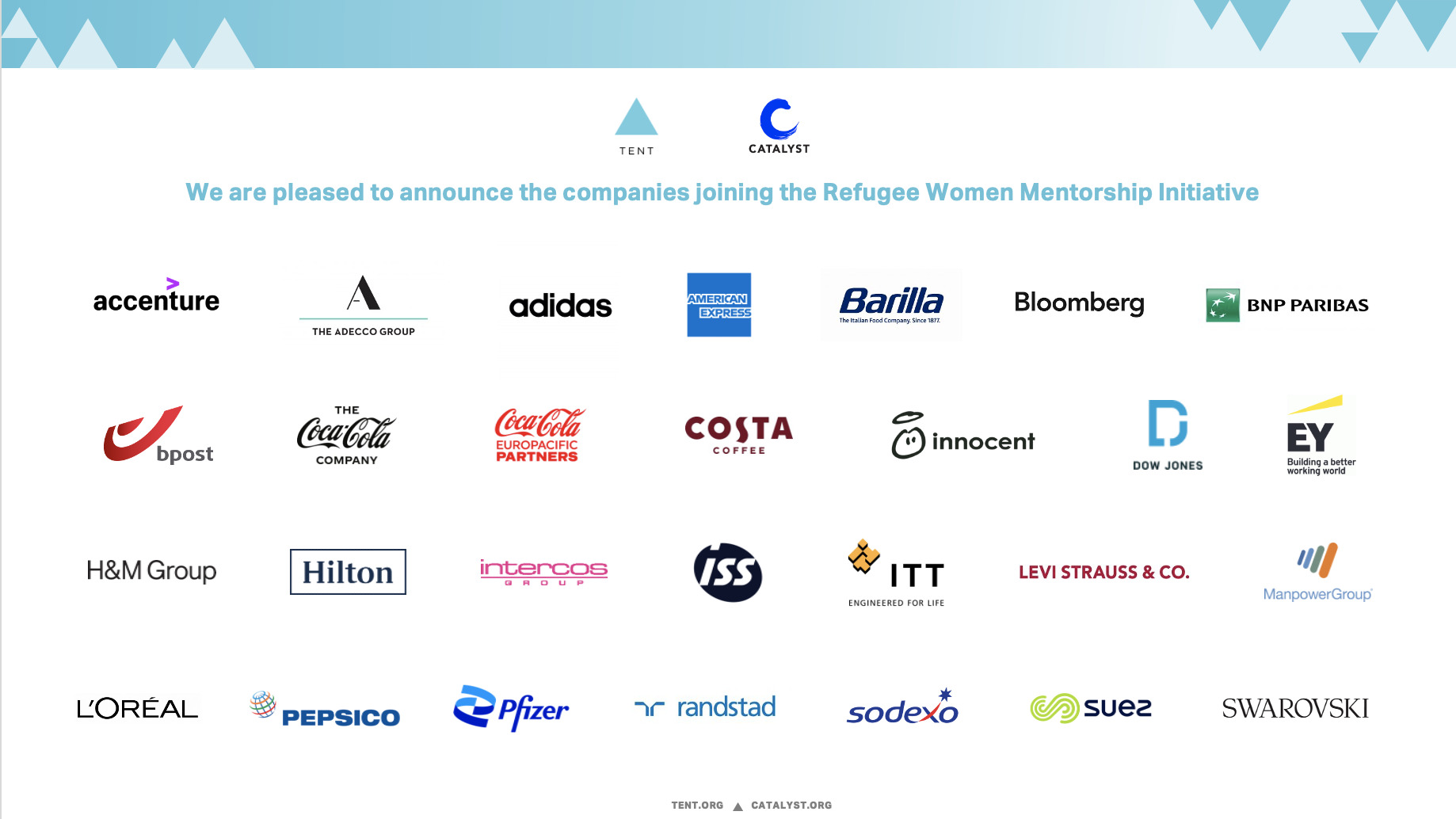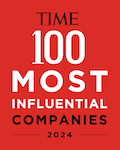PRESS RELEASE: As new research reveals refugee women face high levels of unemployment, leading businesses pledge to help 1,200 refugee women across Europe enter the workforce

- Accenture, adidas, Barilla, BNP Paribas, and L’Oréal are among 24 companies pledging to mentor refugee women with CV writing, job interview preparation, and access to professional networks to better integrate them into the European labour market
Brussels, November 9 2021 — Today, the Tent Partnership for Refugees (Tent) — a network of 200+ companies committed to supporting refugees — and Catalyst — a nonprofit focused on accelerating women in leadership — have launched a pan-European mentorship programme to help refugee women across the continent enter the workforce. At the first ever European Business Summit on Refugee Women, 24 companies, including Accenture, adidas, Barilla, BNP Paribas, H&M group, L’Oreal, and Sodexo have collectively pledged to mentor 1,200 refugee women over the next three years — including recently arrived Afghan women — on practical skills like CV writing, interviewing, and networking to improve their chances of landing decent jobs or advancing their careers.
The initiative comes as a new report, published today by Economist Impact and sponsored by Tent, reveals the state of play on labour market access for refugee women on the continent. While comparable EU-level data is scarce and outdated, the report highlights that refugee women are likely to experience much lower levels of employment compared to refugee men, especially in the first few years after arrival, as well as native-born women. On average, the employment rate among all refugee women in Europe is relatively low at 45% compared with 62% for refugee men. In 2017, in the UK, refugee women were employed at half the rate of native-born women (35% vs 71%, respectively); and Sweden, which is doing comparably better, had a 55% refugee women employment rate compared to 80% for native-born women in 2017. In Germany — which hosts 1.8 million refugees, the highest number in Europe — refugee women had an average employment rate of just 13% in 2017, far below 74% for the native German female population. While a 2019 study showed an improvement in levels of labor market participation among refugee women who had been in Germany for five years, it was still low at 28%.
Ylva Johansson, European Commissioner for Home Affairs said: “Having a job to go to every day is important in so many ways. To earn a living, be part of a community and to contribute with your knowledge and experience. Gender disparities are severely limiting the ability of refugee women to enter the workforce. These disparities are exacerbated by barriers that are faced by all refugees, including complex bureaucratic processes, trouble validating credentials, low proficiency in local languages, and limited knowledge of their rights. It is a top priority for the EU to remedy this. By closing the employment gap faced by refugee women, we can help them economically integrate and thrive in their new communities.”
The report unpacks some of the reasons behind these employment gaps, spotlighting the many hurdles faced by refugee women when seeking employment — ranging from a lack of understanding of the local labour market, through to lower levels of language proficiency, a lack of access to social and professional networks, and higher childcare and domestic burdens.
The European business community can play an important role in helping refugee women overcome some of these barriers. Tent and Catalyst have brought together 24 companies to mentor at least 50 refugee women each over three years as part of their diversity and inclusion programmes, in countries such as France, Germany, Italy, the Netherlands, and the United Kingdom. The companies include: Accenture, the Adecco Group, adidas, American Express, Barilla, Bloomberg, BNP Paribas, Bpost, Coca-Cola together with Coca-Cola Europacific Partners as well as Costa Coffee and innocent, EY, H&M Group, Hilton, Intercos Group, ISS, ITT Motion Technologies, Levi Strauss & Co., ManpowerGroup, L’Oréal, PepsiCo, Pfizer, Randstad, Sodexo, Suez, and Swarovski.
Hamdi Ulukaya, Founder and CEO of Chobani — a major U.S. food company — and Founder of Tent, said: “A decent job is one of the most important things to help refugees better integrate in their new communities — but refugee women are doubly discriminated against and face so many barriers to employment. I am very proud of the companies stepping up today pledging to mentor this population. This is the right thing and the smart thing to do — with Europe facing labour shortages across many sectors, it makes good business sense for companies to prepare new, hard-working, and resilient talent to enter the workforce.”
Nicole van Det, Country Managing Director at Accenture Netherlands, said: “At Accenture Netherlands, we’ve seen first-hand the incredible impact that mentorship can have for refugee women who are looking to start or advance their careers. We’re thrilled to expand on this important work by joining this mentorship initiative — it will not only have a transformational impact on the lives of refugee women, but also on our employees, who will hone new skills like leadership, communications, and empathy.”
Margaret Johnston-Clarke, Global Chief Diversity, Equity & Inclusion Officer at L’Oréal Groupe said: “Gender equity is a long-term and strategic commitment at L’Oréal. Fostering an environment where people of all genders can thrive and express themselves, inside and outside the company, is central to how we create the beauty that moves the world. We are proud to partner with the Tent Partnership for Refugees on this mentorship program specifically for refugee women, to give these women a chance to start, or advance in their careers, helping them to find stability, opportunity and empowerment.”
Allyson Zimmermann, Executive Director, EMEA, Catalyst said: “When working with a company in the Middle East, I had the privilege to meet a refugee woman, who had fled Syria and is now working for a large global organization. Hearing her story, but also her concerns for other refugee women, left a deep impression on my heart. This mentoring programme, that we’re honoured to partner with Tent on, is an important step to raise visibility on the plight of refugee women, but also the impact mentoring can have on their lives, communities and societies as a whole. We’re delighted that so many multinational organisations have warmly embraced this initiative and are taking meaningful action, so no women are left behind.”
Companies interested in joining Tent’s and Catalyst’s Mentoring Refugee Women Initiative, should visit www.tent.org/refugee-women-mentorship-initiative, email [email protected], or read the How companies can mentor refugee women in Europe guide here.
To read more about the state of refugee women’s employment in Europe and how companies can successfully hire refugee women, see the report Employment and integration in Europe: How businesses can hire refugee women and gain a talented workforce here.
ENDS
For media enquiries
Katie Riminton
[email protected]
+32 478 70 19 83
About the Tent Partnership for Refugees
With more and more refugees displaced for longer periods of time, businesses have a critical role to play in helping refugees integrate economically in their new host communities. The Tent Partnership for Refugees mobilises the global business community to improve the lives and livelihoods of more than 30 million refugees who have been forcibly displaced from their home countries. Founded by Chobani’s founder and CEO Hamdi Ulukaya in 2016, we are a network of over 200 major companies committed to including refugees. Tent believes that companies can most sustainably support refugees by leveraging their core business operations – by engaging refugees as potential employees, entrepreneurs, and consumers. The full list of Tent members can be found here. Find out more at www.tent.org.
About Catalyst
Catalyst is a global nonprofit supported by many of the world’s most powerful CEOs and leading companies to help build workplaces that work for women. Founded in 1962, Catalyst drives change with preeminent thought leadership, actionable solutions and a galvanised community of multinational corporations to accelerate and advance women into leadership — because progress for women is progress for everyone. Find out more at www.catalyst.org.
 Tent Named to TIME100 Most Influential Companies List
Tent Named to TIME100 Most Influential Companies List